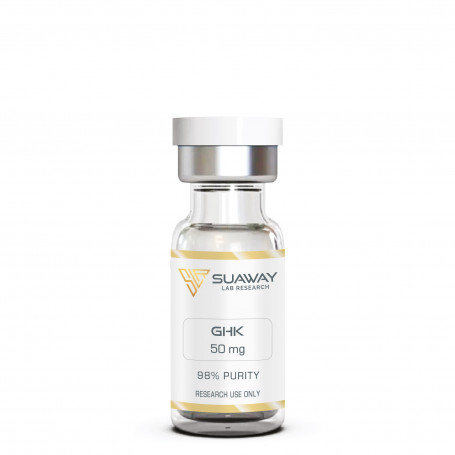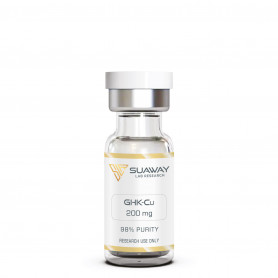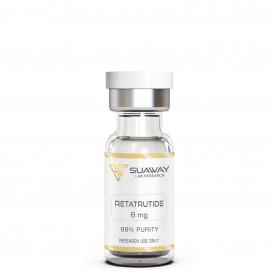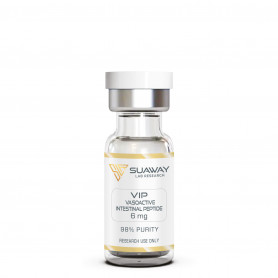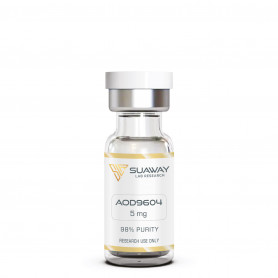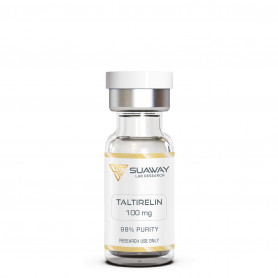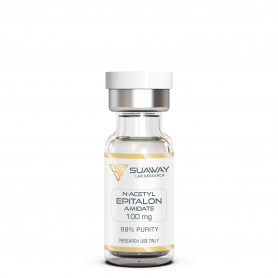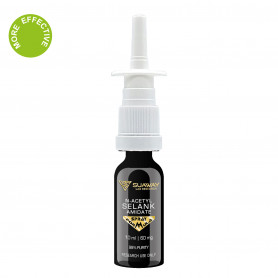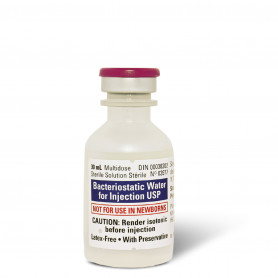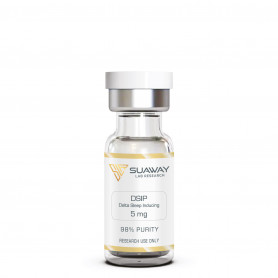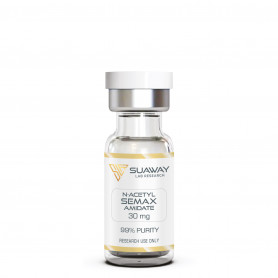GHK - 50mg
GHK is a naturally occurring tripeptide with significant roles in various biological processes. It has been shown to:
- Promote Tissue Repair: Stimulates collagen production and accelerates wound healing.
- Suppress Fibrinogen Synthesis: Reduces inflammation and the risk of thrombosis.
- Activate DNA Repair Genes: Promotes genomic stability and reduces mutation rates.
- Activate the Ubiquitin/Proteasome System: Enhances the clearance of damaged proteins.
- Suppress Insulin and Insulin-like Genes: Improves insulin sensitivity and glucose metabolism.
These effects make GHK a promising candidate for research in cardiovascular health, anti-aging, metabolic function, and tissue regeneration.
Description
DESCRIPTION
GHK (glycyl-L-histidyl-L-lysine) is a naturally occurring tripeptide with significant roles in various biological processes. First discovered in human plasma, it is also found in saliva and urine. GHK has been extensively studied for its regenerative and protective effects on human tissues, influencing a wide range of cellular processes. It is particularly noted for its ability to modulate gene expression, promoting wound healing, skin regeneration, and anti-inflammatory effects.
Effects on Tissue Repair
One of the most well-documented effects of GHK is its ability to promote tissue repair (skin, hair follicles, stomach and intestinal linings, and bone tissue). GHK stimulates the production of collagen, glycosaminoglycans, and other extracellular matrix components essential for wound healing and skin regeneration. It also enhances the migration and proliferation of fibroblasts and keratinocytes, which are crucial for tissue repair. This peptide has shown significant potential in accelerating wound healing, reducing scar formation, and improving skin elasticity and appearance, making it a valuable compound in dermatology and regenerative medicine.
Effects on the Suppression of Fibrinogen Synthesis
GHK suppresses the production of the inflammatory cytokine interleukin-6 (IL-6), a key positive regulator of fibrinogen synthesis. Fibrinogen, a crucial protein involved in blood clotting, is typically elevated during inflammation and tissue damage. High fibrinogen levels are associated with various diseases, including cardiovascular conditions. GHK has been shown to suppress fibrinogen synthesis, potentially reducing the risk of thrombosis and improving vascular health. By inhibiting fibrinogen production, GHK helps reduce inflammation and prevent excessive clot formation, crucial for maintaining cardiovascular health.
Effects on the Activation of DNA Repair Genes
DNA damage is a fundamental cause of aging and various diseases. Efficient DNA repair mechanisms are vital for cellular longevity and health. GHK has been found to activate genes involved in DNA repair, enhancing the cell’s ability to correct DNA damage and maintain genomic stability. By promoting the expression of these genes, GHK aids in preserving cellular integrity, reducing the mutation rate, and supporting overall tissue health, playing a critical role in anti-aging and disease prevention.
Effects on the Activation of the Ubiquitin/Proteasome System
The ubiquitin/proteasome system (UPS) is essential for protein degradation and cellular homeostasis. It helps remove damaged or misfolded proteins, preventing their accumulation, which can lead to cellular dysfunction and diseases such as neurodegeneration. GHK has been demonstrated to activate the UPS, enhancing the clearance of damaged proteins and supporting cellular health. This activation is crucial for maintaining the balance of protein synthesis and degradation, protecting cells from stress and damage.
Effects on the Suppression of Insulin and Insulin-like Genes
GHK also impacts metabolic processes by suppressing insulin and insulin-like genes. The insulin/IGF-1 receptor pathway contributes to the biological aging process in many organisms. Gene expression data suggest that GHK suppresses this system as 6 out of 9 affected insulin/IGF-1 genes are downregulated. Elevated insulin levels are linked to metabolic disorders, including type 2 diabetes and obesity. By modulating these genes, GHK can help improve insulin sensitivity and glucose metabolism. This regulation is beneficial in preventing metabolic syndrome and associated conditions, contributing to better overall metabolic health and reducing the risk of chronic diseases related to insulin resistance.
Conclusion
In conclusion, GHK is a multifaceted peptide with a broad spectrum of biological activities. Its ability to suppress fibrinogen synthesis, activate the ubiquitin/proteasome system, enhance DNA repair, regulate insulin-related genes, and promote tissue repair underscores its significant potential in research. These properties make GHK a promising candidate for developing treatments aimed at improving cardiovascular health, combating aging, enhancing metabolic function, and promoting tissue regeneration. Further clinical studies are essential to fully understand its mechanisms and optimize its use in medical applications.
REFERENCES
L. Pickart et al., "GHK Peptide as a Natural Modulator of Multiple Cellular Pathways in Skin Regeneration" [PubMed]
Y. Dou et al., "The potential of GHK as an anti-aging peptide" [PubMed]
L. Pickart "The human tri-peptide GHK and tissue remodeling" [PubMed]
L. Pickart et al., "The human tripeptide GHK-Cu in prevention of oxidative stress and degenerative conditions of aging: implications for cognitive health" [PubMed]
L. Pickart et al., "The Effect of the Human Peptide GHK on Gene Expression Relevant to Nervous System Function and Cognitive Decline" [PubMed]
L. Pickart et al., "GHK and DNA: resetting the human genome to health" [PubMed]
M. Rosenfeld et al., "GHK peptide prevents sleep-deprived learning impairment in aging mice" [PubMed]
M. Tucker et al., "Intranasal GHK peptide enhances resilience to cognitive decline in aging mice" [PubMed]
DISCLAIMER
This product is intendend for lab research and development use only. These studies are performed outside of the body. This product is not medicines or drugs and has not been approved by the FDA or EMA to prevent, treat or cure any medical condition, ailment or disease. Bodily introduction of any kind into humans or animals is strictly forbidden by law. This product should only be handled by licensed, qualified professionals.
All product information provided on this website is for informational and educational purposes only.

